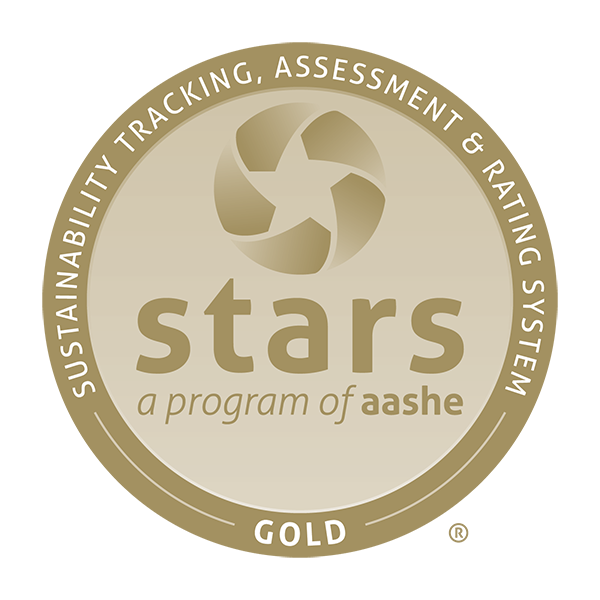
Activities related to sustainable investing are encouraged by the Sustainability Tracking, Assessment, and Rating System (STARS), which ranks higher education institutions in terms of sustainability leadership. Appalachian has attained the gold level, the highest rating, in part because of the existence of programs like the university’s Sustainability Council and the Sustainable Investment Committee.
BOONE—Call it what you will – “sustainable” or “impact” investing, “doing business for good,” “doing good to do well.” It boils down to companies, organizations and institutions investing funds or resources with the intention to generate positive social and environmental impact while reaping a financial return.
The concept of 3E sustainability – economic, environmental and social equity – is core to Appalachian State University and according to Lee F. Ball Jr., interim director of the Office of Sustainability at Appalachian, it is important to put some money where our values are.
To that end, Ball recently charged the university’s Sustainability Investment Committee (SIC) with the task of creating an impact investment fund managed collaboratively by faculty, staff and students.
“We aim to create a blended value fund wherein financial, social and environmental concerns are equally valued, inseparable and taken into account when assessing an investment’s value,” he said. The fund will be supervised by the SIC and an Impact Advisory Council (IAC), which will be comprised of faculty, staff and administrators, as well as industry experts.
“The university has long been recognized nationally for its commitment to sustainability, most recently as a top performer in the 2016 Sustainable Campus Index created by the Association for the Advancement of Sustainability in Higher Education,” Chancellor Sheri N. Everts commented. “It is important that the economic piece of sustainability be incorporated into our academic and fiscal needs.”
According to Appalachian’s Sustainability Academic Fellow and Accounting Professor Tammy Kowalczyk, the SIC was formed in 2011 “as a means of demonstrating a commitment by the university to direct financial resources, when possible, towards support of activities that generated a more positive impact on the environment and society.”
Activities related to sustainable investing are encouraged by the Sustainability Tracking, Assessment and Rating System (STARS), which ranks higher education institutions in terms of sustainability leadership. Appalachian has attained the gold level, the highest rating, in part because of the existence of programs like the university’s Sustainability Council and the SIC.
The SIC members include: Ball, Kowalczyk, Randy Edwards, interim vice chancellor for advancement; Paul Forte, vice chancellor for business affairs; Laura Crandall, associate vice chancellor for advancement services and CFO, Appalachian State University Foundation Inc.; senior Dan Stephenson, an anthropology major from Harriman, New York; and Jim Westerman, a professor of management and the Holshouser Ethics Fellow in the Walker College of Business.
The committee was initiated by Ged Moody, special advisor to the chancellor for sustainability, in 2011 when he was director of the Office of Sustainability. Since its inception, the committee has explored a number of initiatives including a green revolving loan fund and ways to influence the investment of the endowments by the UNC Management Company toward more sustainable investments.
Prior to the creation of the fund, a separate collaborative project with Wake Forest University will provide the research and education needed to understand how to manage the fund. Through a partnership with the Master of Arts in Sustainability program at Wake Forest, students from both universities will participate in a course on impact investing, administered by Kowalczyk and Wake Forest’s Dr. Dan Fogel, for the purpose of developing a model of an impact investment product for an external partner. This same model can be used for the creation of Appalachian’s impact fund, and provide guidance for the management of the fund.
At the same time, the SIC will form the Investment Advisory Council to assist with defining the fund objectives, raising capital, building campus-wide awareness and setting fund guidelines. Their goal is to launch the fund by the end of 2017. Kowalczyk will act as faculty advisor for the student managers and, while any enrolled student can apply to be a manager, she advised that some specific requisite knowledge may be needed to qualify.
The concept of a student-managed fund is not new to Appalachian. Since January 2000, the university has managed the Elbert V. Bowden Student Managed Investment Fund, which was set up by the Department of Finance, Banking and Insurance with the dual purpose of providing students with opportunities to obtain hands-on investment experience and to provide funds to benefit the students and faculty. To participate in managing the fund, students must be selected through a competitive process to become members of the Bowden Investment Group (BIG). The money to establish the fund was contributed by alumni, faculty and other supporters of the department. According to the 2015 BIG annual report, that fund’s portfolio grew to an ending balance on Dec. 31, 2015, of $119,058.99. The account balance when the fund was started in 2000 was $10,678.21.
Kowalczyk said BIG is different from the sustainability fund in that BIG is part of the finance curriculum in the Walker College of Business. Both funds are student managed, she said, but the students who manage the sustainability fund will do it independently and any student with an interest, and appropriate experience, can apply.
“We want to do impact investing as a university, but also provide another student experience that would enable the integration of sustainability into the academy,” Kowalczyk said. “We want to be able to show we are committed to investing in impact.”
Also advising the committee is Erik Melang ’82 ’88, who earned his bachelor’s degree and MBA from the Walker College of Business and is currently a senior managing director at Clean Energy Advisors, an impact investment firm. Melang is also a co-founder of the Intentional Endowments Network, a non-profit organization dedicated to helping universities establish a focus on impact investing, and has advised the student-managed Green Fund at Vanderbilt University.
Many similar impact investing funds are in place at universities nationwide, Kowalczyk said, some of which are student managed. For example, Villanova, Yale and Washington College all have funds that are focused on providing a student experience.
And, while doing good, some portfolios also are doing quite well. Washington College’s student- managed fund, for example, earned 9 percent last year, which is well above average. Furthermore, growth in impact investing in the U.S. from 2012-14 was 75 percent, up to $6.5 trillion; globally, impact investing grew 61 percent to $21.4 trillion.
Once Appalachian’s fund is up and going, Kowalczyk said, the returns can be reinvested and/or used to support activities that are creating measurable positive impacts. This includes other faculty or student-led initiatives in research, education or community outreach that support the university strategic plan’s focus on sustainability.
About Appalachian State University
As a premier public institution, Appalachian State University prepares students to lead purposeful lives. App State is one of 17 campuses in the University of North Carolina System, with a national reputation for innovative teaching and opening access to a high-quality, cost-effective education. The university enrolls more than 21,000 students, has a low student-to-faculty ratio and offers more than 150 undergraduate and 80 graduate majors at its Boone and Hickory campuses and through App State Online. Learn more at https://www.appstate.edu.
What do you think?
Share your feedback on this story.












